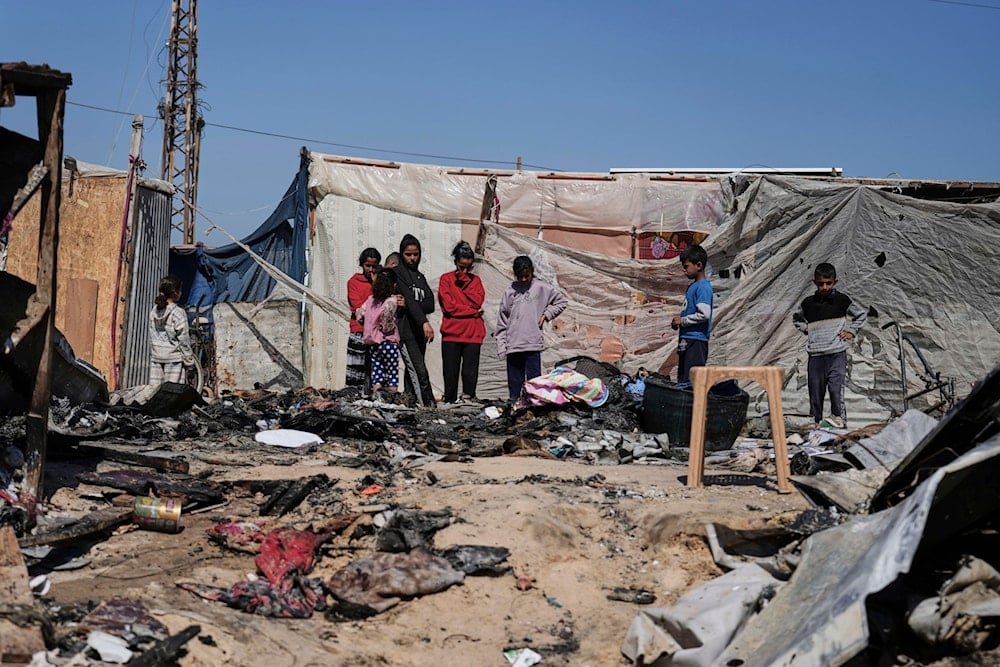Gaza starves under Israeli blockade as aid runs dry, prices soar
The humanitarian crisis in Gaza continues to worsen, exacerbated by the Israeli blockade imposed on Gaza and the Israeli occupation military's deliberate targeting of hospitals and aid centers.
-
 Palestinians inspect the remains of a refugee tent hit by an Israeli airstrike overnight, killing 10 members of the Abu Al-Rous family, in Khan Younis, Gaza Strip, April 17, 2025 (AP)
Palestinians inspect the remains of a refugee tent hit by an Israeli airstrike overnight, killing 10 members of the Abu Al-Rous family, in Khan Younis, Gaza Strip, April 17, 2025 (AP)
Gaza has been driven to a deeper humanitarian crisis by the unprecedented seven-week-long Israeli military blockade that has cut off all aid to the Palestinian strip, The Guardian reported on Saturday, citing medics and humanitarian workers.
Food stockpiled during the two-month ceasefire has been exhausted, leaving Gazans desperate at charity kitchens with empty pots and bowls, while goods at markets are now reportedly selling for 1,400% above ceasefire prices, according to the latest assessment from the World Health Organization.
Famine scarier than airstrikes
Many Palestinians now say they fear famine more than airstrikes, according to those who spoke to the Observer, including Hikmat al-Masri, a 44-year-old university lecturer from Beit Lahia in north Gaza.
Al-Masri said that “many times, I have had to give up my share of food for my son because of the severe shortages. It is the hunger that will kill me – a slow death.”
An estimated 420,000 people are once again on the move due to new Israeli evacuation orders, which have made it difficult to collect reliable data on hunger and malnutrition, though Oxfam estimates that most children are now surviving on less than one meal a day.
About 95% of aid organizations have suspended or reduced their services due to ongoing airstrikes and the blockade, while since February, "Israel" has further tightened restrictions on international staff entering Gaza, and basic medical supplies, including painkillers, are running out.
“Gaza City is packed with displaced people who have fled Israeli troops moving into the north, and they are living on the street or putting their tents inside damaged buildings that are going to collapse,” stated the Gaza emergency coordinator for Doctors Without Borders (MSF).
She added, “There are not enough points of care for so many people. At our burns clinic in Gaza City, we are refusing patients by 10 am and we have to tell them to come back the next day, as we are triaging to make our drug supplies last as long as possible."
According to the United Nations, approximately 70% of Gaza is now either under Israeli evacuation orders or has been absorbed into expanding military buffer zones, with the newly established Rafah security zone alone accounting for one-fifth of the entire territory.
Concerning shift in Israeli military approach
As the space available to Gaza's residents continues to shrink, aid workers said they are increasingly concerned that the rules of engagement followed by the Israeli military may have shifted since the collapse of the ceasefire, pointing to the recent bombings of Nasser Hospital in Khan Younis and al-Ahli Hospital in Gaza City.
Two people were killed in the Nasser attack, which struck a building where members of an international medical team were present, and while no casualties were reported in the al-Ahli strike, the hospital’s intensive care and surgery departments were destroyed according to medics. In both cases, the Israeli occupation military alleged that it had targeted members of Hamas.
“People in Gaza like having international staff around because they assume it affords them more protection and the IDF [Israeli military] is less likely to attack the building or the area,” a senior aid official told The Guardian.
At the start of the war, the aid official said that they would evacuate if an airstrike hit two kilometres away, but now they only move if a building next door is struck, with little to no warning and often just 20 minutes to evacuate the sick, making their exposure to danger far greater as they believe "Israel" is trying to force them to operate on its terms.
"Israel" responded to the aid worker's claim by repeating its allegation that Hamas has a "documented practice" of operating within densely populated areas," and claiming that the Israeli army is taking "feasible precautions" in its attacks.
Additionally, the occupation has long claimed that Hamas diverts significant portions of the aid that reaches Gaza, enabling the group to sustain its control by either withholding the aid for its own use or selling it at inflated prices to desperate civilians.
Recently, Israeli media reported that the government is working on creating an Israeli-controlled mechanism to distribute aid in Gaza through private contractors, however, no timeframe was provided, prompting aid agencies to say that the crisis in the Strip will only worsen.

 5 Min Read
5 Min Read










